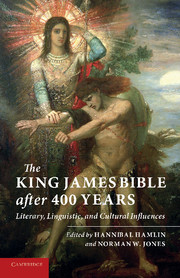Book contents
- Frontmatter
- Contents
- List of Figures
- List of Illustrations
- List of Contributors
- Acknowledgments
- Introduction
- Part I The Language of the King James Bible
- Part II The History of the King James Bible
- 3 The materiality of English printed Bibles from the Tyndale New Testament to the King James Bible
- 4 Antwerp Bible translations in the King James Bible
- 5 Philip Doddridge’s New Testament
- 6 Postcolonial notes on the King James Bible
- 7 From monarchy to democracy
- Part III Literature and the King James Bible
- Chronology of major English Bible translations to 1957
- Chronology of English Bible translations since 1957
- Select bibliography on the King James Bible
- Index of Bible quotations
- General index
7 - From monarchy to democracy
The dethroning of the King James Bible in the United States
Published online by Cambridge University Press: 05 May 2014
- Frontmatter
- Contents
- List of Figures
- List of Illustrations
- List of Contributors
- Acknowledgments
- Introduction
- Part I The Language of the King James Bible
- Part II The History of the King James Bible
- 3 The materiality of English printed Bibles from the Tyndale New Testament to the King James Bible
- 4 Antwerp Bible translations in the King James Bible
- 5 Philip Doddridge’s New Testament
- 6 Postcolonial notes on the King James Bible
- 7 From monarchy to democracy
- Part III Literature and the King James Bible
- Chronology of major English Bible translations to 1957
- Chronology of English Bible translations since 1957
- Select bibliography on the King James Bible
- Index of Bible quotations
- General index
Summary
In 1986, the New International Version (NIV) accomplished what dozens of other American translations had been unable to do: dethrone the King James Bible (KJB) as the bestselling Bible version among American Protestants, a position it had held for nearly three hundred and fifty years. The impressively long reign of the KJB in the United States is important for many reasons, but its relatively recent migration from the center of American biblical culture is particularly interesting for the way in which it echoes the American political trope of democracy replacing monarchy. When Americans wrote and signed the Declaration of Independence in 1776 and then ratified the Constitution over a decade later, they turned away from Britain’s monarchal tradition with its pronounced emphasis on aristocracy in favor of governance which emphasized more common rule. The story of Bible translation and usage in the United States tells an eerily similar tale. At the end of the twentieth century, the remarkable reign of the KJB in America finally gave way to an ever-increasing number of new biblical translations which ultimately offered American Bible readers not a single authoritative voice, but a multitude of voices to guide them. Monarchy had once again been replaced by democracy.
The KJB, however, had not been intended as a regal, elite translation to be read only by a chosen few. Its translators had always wished it to be a translation capable of being “understood even of the very vulgar.” This desire for a vernacular Bible still echoes today as the quest for an intellectually accessible translation in a common idiom stands as the single most important driving force in contemporary American Bible translation and publishing.
- Type
- Chapter
- Information
- The King James Bible after Four Hundred YearsLiterary, Linguistic, and Cultural Influences, pp. 164 - 178Publisher: Cambridge University PressPrint publication year: 2010



